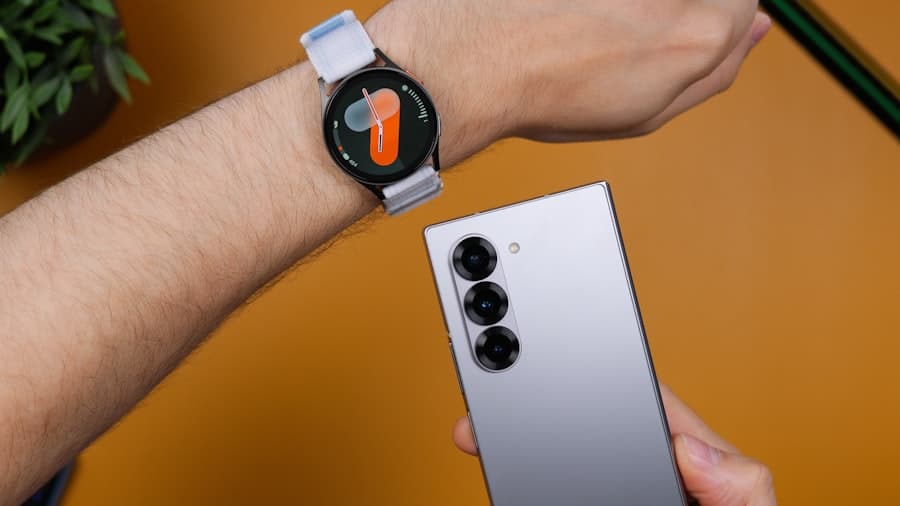The advent of artificial intelligence (AI) has revolutionized numerous sectors, and mental health care is no exception. AI wearables, which encompass a range of devices such as smartwatches, fitness trackers, and specialized sensors, are increasingly being integrated into mental health monitoring and treatment. These devices leverage advanced algorithms and machine learning techniques to collect and analyze data related to an individual’s physiological and behavioral patterns.
By doing so, they provide insights that can lead to early detection of mental health issues, particularly depression, which is one of the most prevalent mental health disorders worldwide. The integration of AI into wearable technology represents a significant shift in how we approach mental health care. Traditionally, mental health assessments relied heavily on self-reported symptoms and clinical evaluations, which can often be subjective and influenced by various factors.
In contrast, AI wearables offer a more objective means of monitoring mental health by continuously tracking biometric data such as heart rate variability, sleep patterns, and physical activity levels. This continuous data collection allows for a more nuanced understanding of an individual’s mental state, potentially leading to timely interventions that can mitigate the severity of conditions like depression.
Key Takeaways
- AI wearables are a new technology that combines artificial intelligence and wearable devices to detect and monitor mental health conditions such as depression.
- Early detection of depression is crucial for effective treatment and management of the condition, as it can prevent further deterioration of mental health.
- AI wearables work by analyzing various data points such as heart rate, sleep patterns, and activity levels to detect changes that may indicate symptoms of depression.
- Case studies have shown that AI wearables have successfully detected depression symptoms in individuals, leading to early intervention and improved mental health outcomes.
- The potential impact of AI wearables on mental health treatment is significant, as they can provide continuous monitoring and personalized interventions for individuals with depression, ultimately improving mental health awareness and access to care.
The Importance of Early Detection of Depression
Early detection of depression is crucial for effective treatment and management of the disorder. Research indicates that the sooner an individual receives appropriate care, the better their chances are for recovery. Depression can manifest in various ways, including persistent sadness, loss of interest in activities, changes in appetite, and difficulty concentrating.
However, these symptoms can often go unnoticed or be misattributed to other life stressors. Consequently, many individuals may suffer in silence for extended periods before seeking help. The implications of delayed diagnosis are profound.
Untreated depression can lead to a cascade of negative outcomes, including impaired functioning in personal and professional domains, increased risk of substance abuse, and even suicidal ideation. Moreover, the economic burden associated with untreated mental health conditions is staggering, with estimates suggesting that depression costs the global economy over $1 trillion annually in lost productivity. Therefore, leveraging technology to facilitate early detection can not only improve individual outcomes but also alleviate broader societal costs associated with mental health disorders.
How AI Wearables Work to Detect Depression Symptoms

AI wearables utilize a combination of sensors and algorithms to monitor various physiological indicators that may correlate with depressive symptoms. For instance, many wearables are equipped with heart rate monitors that can detect changes in heart rate variability (HRV), a known indicator of stress and emotional well-being. A decrease in HRV has been associated with increased levels of anxiety and depression.
By continuously tracking HRV over time, these devices can identify patterns that may suggest the onset of depressive episodes. In addition to heart rate monitoring, AI wearables often incorporate accelerometers to assess physical activity levels. Research has shown that individuals experiencing depression may exhibit reduced physical activity due to fatigue or lack of motivation.
By analyzing movement data, AI algorithms can flag significant deviations from an individual’s baseline activity levels. Furthermore, sleep quality is another critical factor; many wearables track sleep patterns and disturbances. Poor sleep quality is both a symptom and a contributing factor to depression, making it an essential variable for monitoring mental health.
Case Studies of AI Wearables Successfully Detecting Depression
Several case studies illustrate the effectiveness of AI wearables in detecting depression symptoms early on. One notable example involves a study conducted by researchers at Stanford University, where participants wore smartwatches equipped with sensors that monitored their physiological data over several months. The study found that changes in heart rate variability and sleep patterns could predict depressive episodes with remarkable accuracy.
Participants who exhibited significant deviations in these metrics were subsequently referred for psychological evaluation and treatment. Another compelling case study comes from a collaboration between a tech company and a mental health organization that developed a specialized wearable device designed explicitly for monitoring mood disorders. This device utilized machine learning algorithms to analyze data collected from users’ daily activities, social interactions, and biometric signals.
The results demonstrated that the device could accurately identify users at risk for depression based on their behavioral patterns. Users who received alerts about potential depressive symptoms were able to seek help proactively, leading to improved mental health outcomes.
Potential Impact of AI Wearables on Mental Health Treatment
The potential impact of AI wearables on mental health treatment is profound and multifaceted. By facilitating early detection of depression, these devices can empower individuals to take charge of their mental health proactively. This shift from reactive to proactive care can lead to more timely interventions, reducing the severity and duration of depressive episodes.
Moreover, AI wearables can enhance the therapeutic process by providing clinicians with real-time data on their patients’ mental states, allowing for more personalized treatment plans. Additionally, AI wearables can help reduce the stigma associated with seeking help for mental health issues. As these devices become more commonplace and integrated into daily life, individuals may feel more comfortable discussing their mental health concerns with healthcare providers.
The normalization of using technology for mental health monitoring can foster an environment where seeking help is viewed as a proactive step rather than a sign of weakness.
Ethical Considerations and Privacy Concerns with AI Wearables

Privacy Concerns and Data Security
The use of AI wearables in mental health care raises significant ethical considerations, particularly with regards to the collection and analysis of sensitive personal data. It is essential that users are fully informed about how their data will be used and who will have access to it, ensuring that they provide informed consent.
The Risks of Misuse
Moreover, there is a risk of misuse of data collected by AI wearables.
Implementing Robust Data Protection Measures
To address these concerns, robust data protection measures must be implemented to safeguard users’ privacy while still allowing for the beneficial use of data in improving mental health outcomes. Transparency in data handling practices is essential to build trust between users and developers, and to ensure that the benefits of AI wearables in mental health care are realized without compromising individual privacy.
Future Developments in AI Wearables for Mental Health
The future of AI wearables in mental health care holds immense promise as technology continues to evolve. One area of development is the integration of more advanced machine learning algorithms that can provide even more accurate predictions regarding mental health status based on a wider array of data inputs. For example, future wearables may incorporate voice analysis technology that assesses speech patterns for signs of depression or anxiety during conversations.
Additionally, there is potential for greater personalization in AI wearables through the incorporation of user feedback mechanisms. By allowing users to input their subjective experiences alongside biometric data, developers can create more tailored interventions that resonate with individual needs. This could lead to the development of adaptive algorithms that adjust recommendations based on real-time feedback from users about their emotional states.
The Role of AI Wearables in Improving Mental Health Awareness
AI wearables represent a transformative approach to mental health awareness and treatment by providing innovative tools for early detection and ongoing monitoring of conditions like depression.
By harnessing the power of AI in wearable technology, we can pave the way for a future where mental health care is more accessible, personalized, and effective than ever before.
TechRepublic recently published an article that helps IT decision-makers identify technologies that can benefit their organizations. This article could be of interest to those exploring the potential of AI wearables in detecting early symptoms of depression. To read more about this topic, check out

